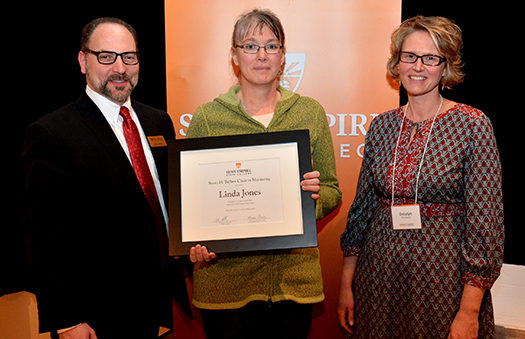March 21, 2018
Linda Jones Receives Susan H. Turben Chair in Mentoring

(SARATOGA SPRINGS, N.Y. – March 30, 2018) Linda Jones, associate professor of environmental geosciences in Empire State College’s Science, Math and Technology Division, was selected for the prestigious Susan H. Turben Chair in mentoring by SUNY Empire State College. She also serves as faculty chair of the college’s Northeast region.
“Although known as a teaching college, SUNY Empire has always attracted professors who are doing exciting and cutting-edge research, and presenting their findings at academic conferences and in journals,” said Walter Williams, vice president for Advancement with the college. “With her focus on citizen scientists, the environment and climate change, Linda Jones is one of those professors. I commend her for being appointed to the endowed Susan H. Turben Chair in Mentoring, established by one of the very first graduates of the college.”
“I am honored to have received the Turben Chair in Mentoring award,” said Jones, “and I am excited about the opportunities that this award provides related to mentoring and student-centered research.”
Jones is particularly active in citizen science and generously shares her excitement, research methods and expertise with her students. Her supervisor, Associate Dean Brian Hagenbuch wrote of Jones, “She has dedicated her career to the cultivation of scientific literacy through citizen science, engaging her students and the public in opportunities to actively participate in providing a framework to encourage an active, engaged and informed citizenry capable of participating in the important decisions that affect their lives and communities.”
Jones’ research interests include the examination of climate change and non-native species in New York state through STEM education and citizen science projects. She examined 30 years of ecosystem dynamics and soil development in the prairie and forested areas of the Southwest Minnesota State University Nature Area, and was the primary advisor for undergraduate research projects involving environmental change, soil development and vegetation dynamics. She later shared her findings at the Annual Undergraduate Research Conference at SMSU.
She used dendrochronology (tree-ring dating) and soil analysis to evaluate forest decline, including the Sugar Maple dieback at the deciduous forest/boreal forest ecotone in Lake Superior Provincial Park. She also used dendrochronology to evaluate metal contaminate flow in a karst landscape in Rockford, Illinois, and the distribution of metals in tree cores associated with ultramafic soils in New Caledonia. She’s examined the effects of fire suppression and prescribed burns on forest and prairie restoration projects, among other research interests.
Jones has published widely in several scholarly journals and made numerous presentations at academic conferences as well.
She earned her Ph.D. from Northern Illinois University, in Geology and Environmental Sciences; her M.S. from Northern Illinois University as well, her M.A. in English from Eastern Michigan University, and her B.A. in English from the University of Illinois.
About the Susan H. Turben Chair in Mentoring
The Susan H. Turben Chair in Mentoring was created to promote excellence in mentoring as the primary relationship between students and faculty. This endowed chair is named in honor of Susan H. Turben, the second graduate of the college and an internationally recognized expert on families and child development.
Along with serving as a member of the Empire State College Foundation Board of Directors, Turben has been a long-time, passionate supporter of professional development opportunities for the college’s faculty mentors.
About SUNY Empire State College
Empire State College, the nontraditional, open college of the SUNY system, educates nearly 18,000 students worldwide at eight international sites, more than 30 locations in the state of New York, online, as well as face to face and through a blend of both, at the associate, bachelor’s and master’s degree levels.
The average age of an undergraduate student at the college is 35, and graduate students’ average age is 40.
Most Empire State College students are working adults. Many are raising families and meeting civic commitments in the communities where they live, while studying part time.
In addition to awarding credit for prior college-level learning, the college pairs each undergraduate student with a faculty mentor who supports that student throughout his or her college career.
Working with their mentors, students design an individual degree program and engage in guided independent study and course work onsite, online or through a combination of both, which provides the flexibility for students to choose where, when and how to learn.
The college’s 78,000 alumni are active in their communities as entrepreneurs, politicians, business professionals, artists, nonprofit agency employees, teachers, veterans and active military, union members and more.
The college was first established in 1971 by the SUNY Board of Trustees with the encouragement of the late Ernest L. Boyer, chancellor of the SUNY system from 1970 to 1977.
Boyer also served as United States commissioner of education during the administration of President Jimmy Carter, and then as president of the Carnegie Foundation for the Advancement of Teaching.
More information about the college is available at www.esc.edu.